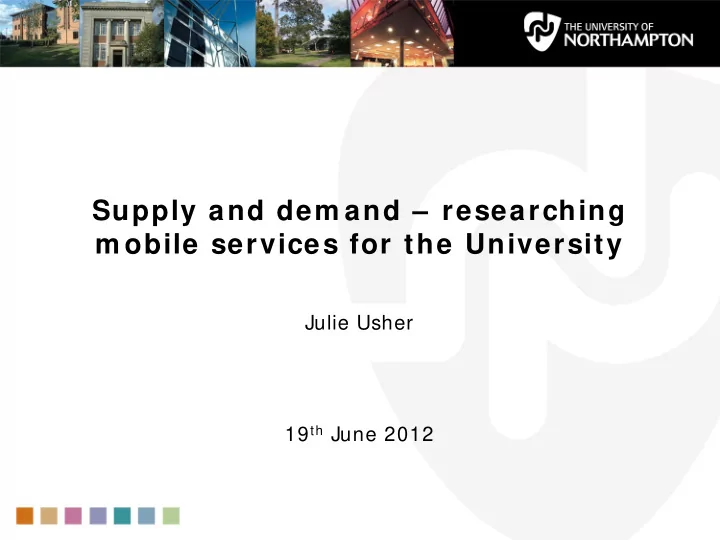

Supply and dem and – researching m obile services for the University Julie Usher 19 th June 2012
W hy m obile? Drivers • Strategic planning and pedagogy • Marketing • Demand?
I nvestigating dem and Annual ‘mobile survey’: • Nov 2010: – representative sample of 5605 students and 305 staff – completed by 772 respondents (13% response) – 88% students and 12% staff. • Dec 2011 – representative sample of 2490 students and 1613 staff – completed by 678 respondents (16.5% response) – 34% students and 66% staff
Key findings What technology do students and staff own? (based on data from Dec 2011)
Key findings What are they doing with the technology now? • 95% of respondents access the internet every day • 56% regularly use a mobile to browse the web • 29% regularly use a mobile to take notes • 17% regularly use a mobile to access and edit documents • 10-12% choose a mobile as their preferred device for research, productivity and social learning (based on data from Dec 2011)
Key findings What would they like to be able to do in the future? Services rated most useful to have on a mobile: (based on data from Nov 2010)
Responding to dem and The MALT project: • Infrastructure • Mobile technologies • Effective practice
Leading innovation in pedagogy Pilot projects • Environmental Sciences • Occupational Therapy • Foundation Art & Design: http: / / bit.ly/ uonmobileart
Feedback so far • Over 10,000 downloads of the app • Over 3,500 ‘active users’ of the mobile VLE • 85% of students rate mobile access to NILE and timetables as ‘very useful’ • Directory and library services also highly rated by staff and students (75% or more rate these as useful)
Next steps 1 – further developm ent User driven– nearly 400 free text suggestions and comments in the 2011 survey
Next steps 1 – further developm ent Best use of the technology – initial demand doesn’t always equate to actual use
Next steps 2 – em bedding • Disseminating good practice – Ongoing research, case studies and presentations • Scalability and support – Guides, training and awareness raising – Support for supplied devices? – Support for student devices?
Questions / com m ents?
Contact details Julie Usher Learning Technology University of Northampton Email: julie.usher@northampton.ac.uk Twitter: @jules_u Web: northampton.ac.uk/ learntech
References etc. Useful links • More about the iNorthampton project: http: / / www.northampton.ac.uk/ mobile • Guidelines on accessibility for the mobile web: http: / / www.w3.org/ Mobile/ • TechDis on mobile learning: http: / / www.jisctechdis.ac.uk/ techdis/ investinyourself/ freeresources/ accessiblemobilelear ning • Traxler, J. (2010) “Students and mobile devices.” ALT-J Research in Learning Technology [ online] 18.2, p149-160. Available from: http: / / www.researchinlearningtechnology.net/ index.php/ rlt/ article/ view/ 10759 [ Accessed 10th February 2012] • More info on JADU MyAPI (presentation by Steve Martin): http: / / speakerdeck.com/ u/ s2martin/ p/ inorthampton-and-jadu Image credits • Photography by Rob Farmer, University of Northampton
Recommend
More recommend